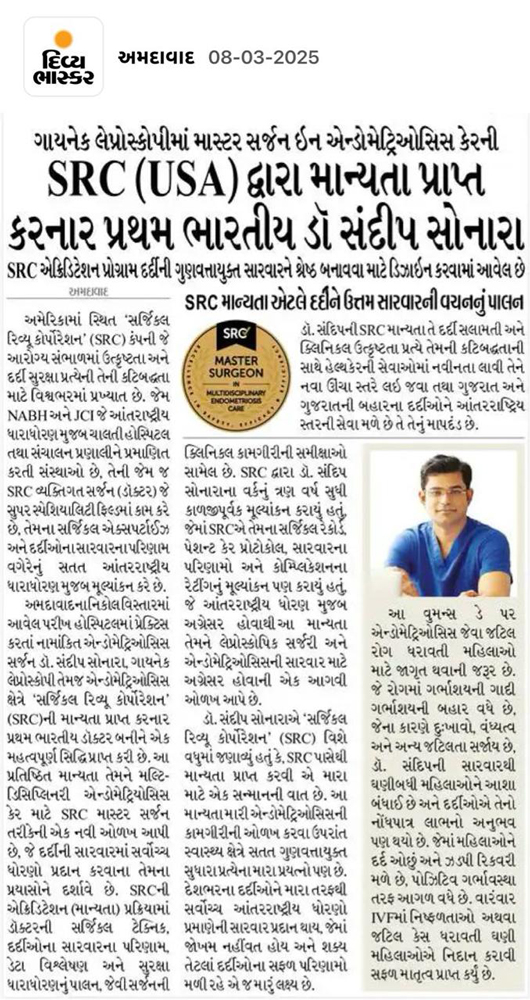There are some factors that increase the risk of ovarian cancer, but the exact cause is not clear yet.
- It is more prevalent in Native Americans and whites than Hispanics and Asians.
- Women with a family history of breast BRCA/BRCA2/Lynch syndrome or ovarian cancer is more vulnerable to develop such ovarian tumors at young age
- Higher in women aged between 55-65.
- Lynch syndrome and Peutz-Jeghers syndrome are inherited genetic conditions which cause ovarian cancer.
- Ever had breast, colorectal, or endometrial cancer in past
- Obesity
- Early menarche
- Late menopause
- Nulliparity
Most ovarian cancers aren’t discovered until they have developed into more severe stages. Early-stage symptoms of this disease, are very unusual such as stomach and digestive problems. Therefore, our doctor recommends below tests to diagnose ovarian cancer:
- Tumor markers: CA-125 is the most common elevated tumor marker in epithelial ovarian cancer. In Germ cell tumors, depending upon the type and histology of the tumors the elevated tumor markers are- AFP, BHCG, S.INHIBIN, CEA,CA19-9, and LDH.
- Pelvic or Transvaginal Ultrasound: The Transvaginal ultrasound is mostly the first imaging modality which is done by a gynec cancer doctor. It examines the size,type, site of the ovarian tumor and its relation to surrounding organs.
- MRI &/or CT scan &/or PET scan: After the primary insight about the tumor, MRI &/or CT scan &/or PET scan is advised depending upon the condition of the patient for exact pre operative mapping, lymph nodes status, invasion to surrounding organs, and to decide the stage of the cancer.
- Biopsy of tumor:
A tiny tissue sample from the ovaries in advanced stages of ovarian cancer is done to check the histology for cancer cells. This can be done with a needle under ultrasound or a CT scan guidance. Another option is to perform a biopsy through a laparoscopic surgery. If there is abdominal fluid, a sample can be tested for cancerous cells. If you are looking for the laparoscopic option for the
ovarian cancer treatment in Ahmedabad
, your search ends here!
Here are some treatment options for ovarian cancer patients
Surgery:
This usually involves the removal of any cancerous organs as well as your reproductive organs. Suppose you are planning to get pregnant and are at the initial stage of this cancer, Surgery may involve removing only the cancerous ovary and performing a biopsy of the other ovary, as well as removing omentum, para-aortic and pelvic lymph nodes biopsy, analysis of fluid build-up within the abdomen, peritoneum covering pelvis.This procedure is performed Laparoscopically by Dr Sandip Sonara,
gynecological cancer specialist in Ahmedabad
to provide best output for the cancer surgery.
- Chemotherapy: Chemotherapy medications help to either destroy cancer cells or restrict their development.
- Radiotherapy : The goal of this therapy is to either destroy or stop the growth of cancer cells by using radiation.
- Laparoscopic cytoreductive Surgery – debulking Surgery:
The uterus, cervix, and a piece of the vagina, adjacent lymph nodes, fallopian tubes, and other ovariy are surgically removed during this palliative treatment in advanced stage of ovarian cancer. Following debulking surgery, chemotherapy or radiation treatment eliminates the remaining cancer cells. Debulking could also be advised as a component of pain management in the advanced stage of ovaries. If you are seeking such
gynecological cancer treatment in Ahmedabad
, book your appointment today.
Our hospital team has designed regular gynecological health packages that are individualized for every patient, taking their family history into account. Our staff is well trained in operating such cases, and our operation theatre is fully equipped to handle such complex surgeries like laparoscopic
ovarian cancer surgery in Ahmedabad
, which provide many benefits to the patient in terms of postoperative recovery, pain, hospital stay, small incision, and better patient satisfaction compared to open cut surgeries.





